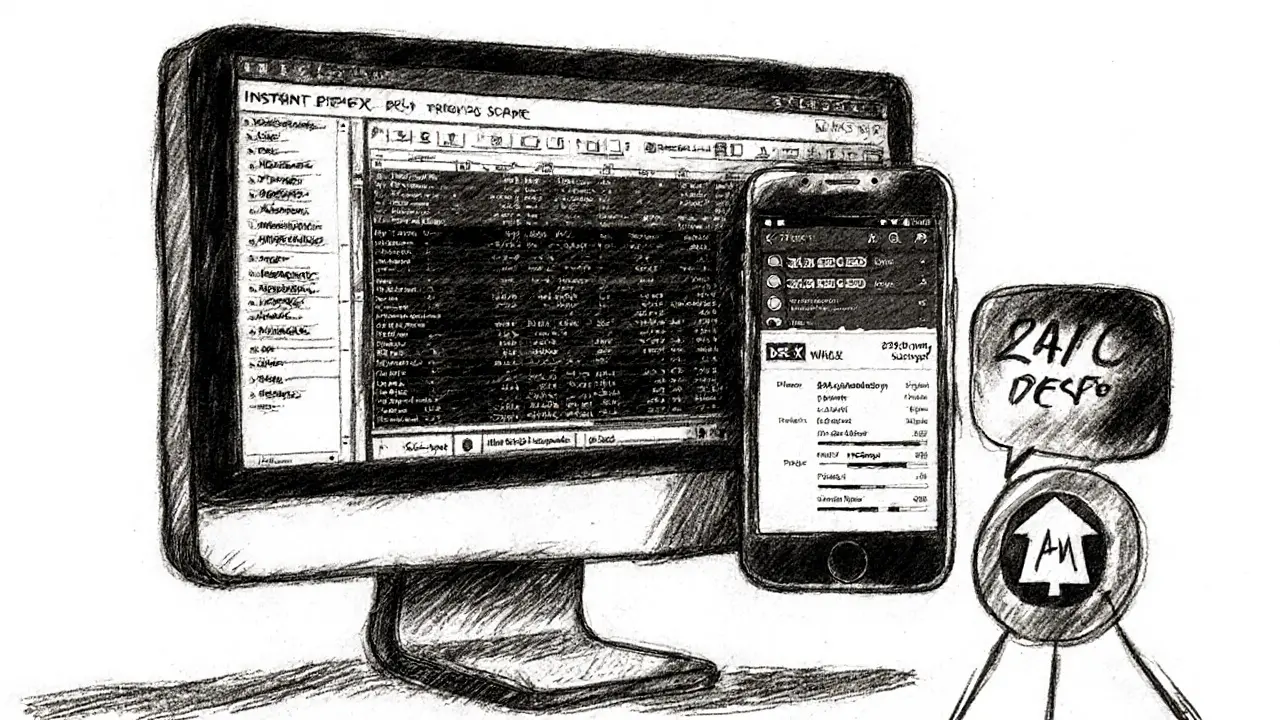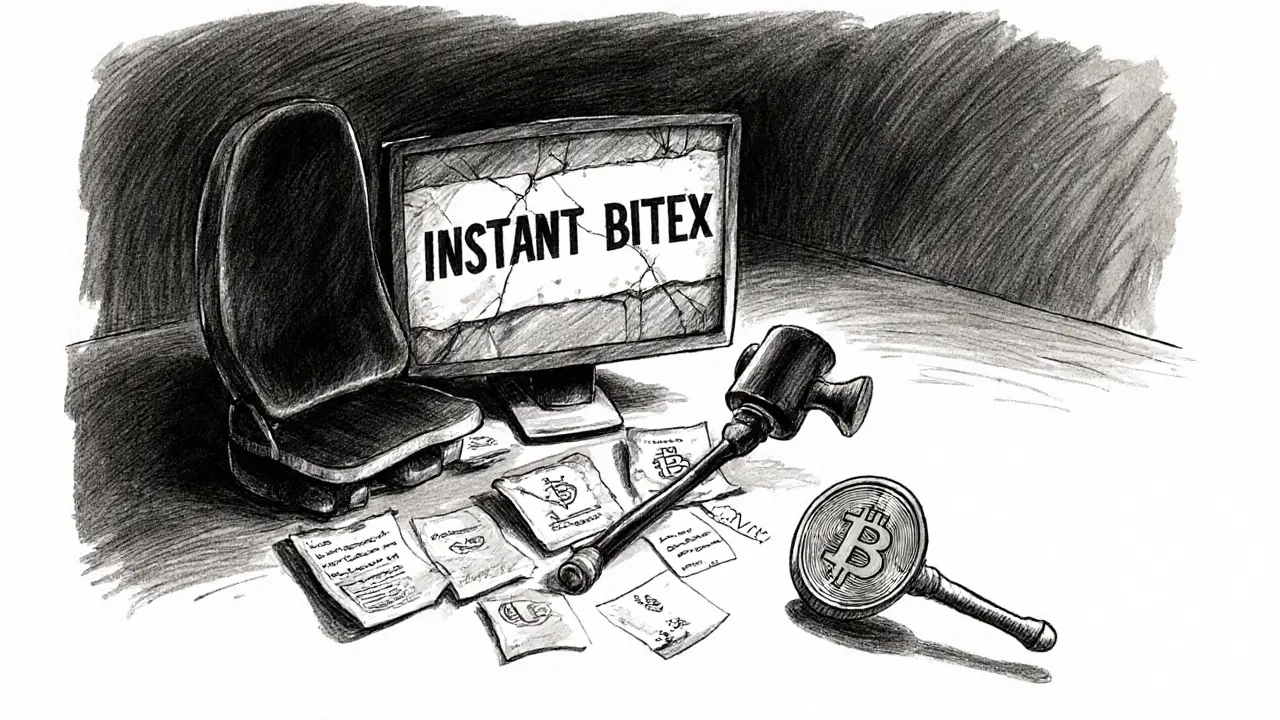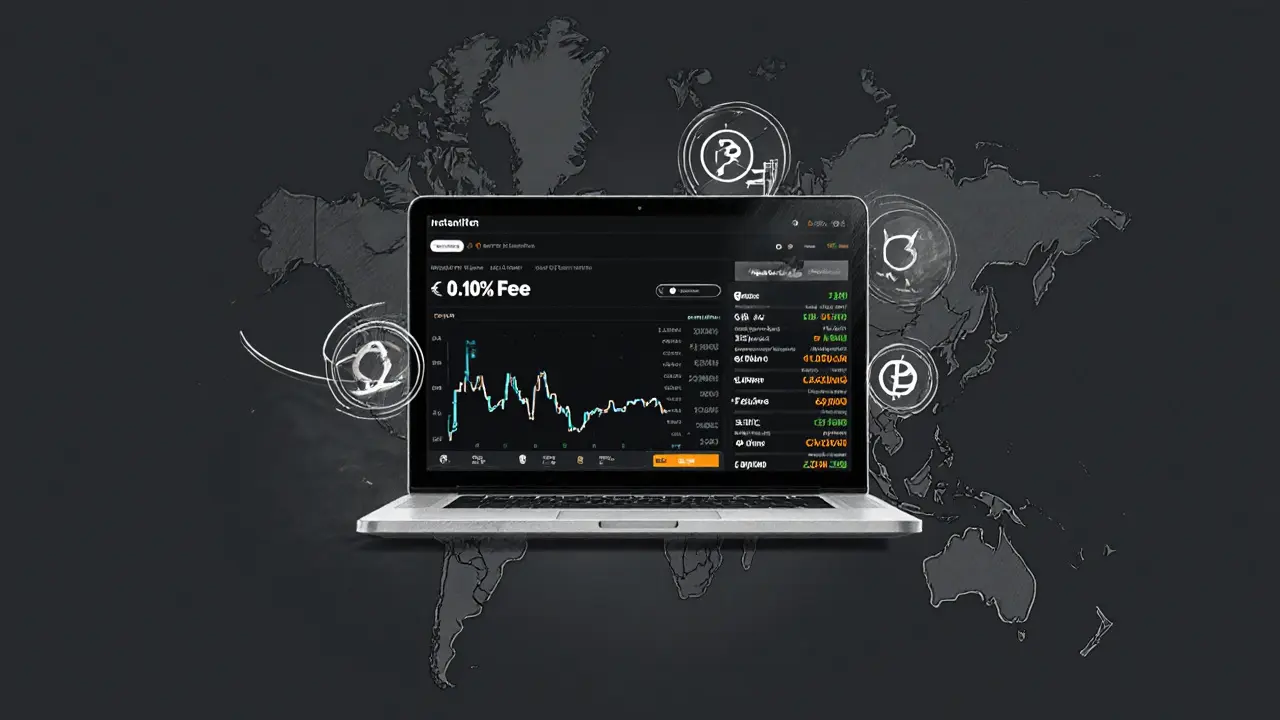Instant Bitex Fee Comparison Calculator
Instant Bitex offered a flat 0.10% trading fee (vs industry average 0.25%) and 0.0005 BTC withdrawal fee (vs industry average 0.001 BTC). Calculate your potential savings on trades and withdrawals.
Fee Comparison Calculator
Your Savings
Instant Bitex ComparisonTrading Fees
Withdrawal Fees
When you type Instant Bitex is a UK‑based cryptocurrency exchange that launched in 2018 with a promise of ultra‑fast trades, low fees, and a mixed central‑plus‑decentralized platform. It marketed itself as a one‑stop shop for seasoned traders, offering everything from margin leverage to an OTC desk. The twist? By October 2025 the platform is officially shut down, and the data that once powered its charts has vanished.
What Instant Bitex actually offered
During its seven‑year run the exchange bundled a surprisingly deep feature set:
- Crypto‑to‑crypto trading pairs (no fiat on‑ramps).
- Margin and leverage options for high‑risk strategies.
- Decentralized exchange (DEX) functionalities alongside a traditional order book.
- Launchpad services for early‑stage token sales.
- Desktop and mobile apps plus full‑stack API access.
- OTC desk for large‑volume moves.
- 24/7 live chat support.
Fee structure - the real selling point
Instant Bitex’s headline hook was a flat 0.10% trading fee for both makers and takers. Most rivals quoted around 0.25% on average, so the exchange saved users roughly $15‑$30 per $10,000 trade, depending on volume. Withdrawal fees were also modest: Bitcoin withdrawals cost 0.0005 BTC, well under the industry norm of 0.001 BTC at the time.
Where the platform fell short
The low‑fee advantage was offset by a single critical weakness - no fiat deposit support. New investors had to first buy crypto on a fiat‑friendly exchange, then move the assets to Instant Bitex to trade. That extra step created friction and limited the exchange’s appeal to newcomers. In an era where regulatory pressure pushed most platforms to add bank transfers and credit‑card purchases, Instant Bitex’s crypto‑only model felt dated.
Security and compliance
Security-wise the platform wasn’t shabby. It employed SSL encryption from Let’s Encrypt, enforced multi‑factor authentication, and kept cold‑storage reserves for the majority of user funds. However, it never secured a full license from top‑tier financial regulators (e.g., FCA, FinCEN). Analysts warned that the lack of formal oversight could expose users to higher custodial risk, especially after the exchange ceased operations.
Performance and user experience
Technical reviews highlighted an “exceptionally fast” web interface, with page‑load times measured under one second on average. The mobile app mirrored this speed, offering near‑real‑time order book updates. Customer support was advertised as 24/7, though concrete response‑time metrics are unavailable. User sentiment, based on the two AffGadgets reviews, averaged four out of five stars, praising the low fees and smooth UX but noting the small community size.

How Instant Bitex stacked up against the market
| Metric | Instant Bitex | Industry Avg. |
|---|---|---|
| Trading fee (maker/taker) | 0.10% | 0.25% |
| BTC withdrawal fee | 0.0005 BTC | 0.001 BTC |
| Fiat deposit support | No | Yes (most exchanges) |
| Regulatory license | None | Typically FCA, FINMA, etc. |
| Average user rating (sample) | 4/5 | 3.5/5 |
Why the exchange shut down
By late 2024 regulatory scrutiny intensified across Europe and the UK. Exchanges handling fiat were forced to adopt AML/KYC regimes, maintain capital buffers, and submit regular audits. Instant Bitex’s decision to stay crypto‑only saved it from some compliance costs, but also barred it from the larger, faster‑growing market of fiat‑on‑ramp users. Coupled with a modest user base (the two public reviews suggest a niche community) and increasing competition from platforms that offered both low fees and fiat gateways, the business model became unsustainable. CoinCodex’s October 2025 notice bluntly states the exchange is “no longer operational” and that “trading data is unavailable,” confirming the final shutdown.
What to do if you were an Instant Bitex user
If you still have assets locked on the platform, the first step is to contact the archived support email (if still reachable) and request a withdrawal. In most cases, the exchange’s cold‑wallet addresses were publicly disclosed, so users could verify transaction status on a block explorer. After pulling out the funds, consider moving to a regulated exchange that offers both crypto‑to‑crypto and fiat on‑ramps - examples include Binance, Kraken, or Coinbase.
- Check the withdrawal fee schedule on the new platform (often similar or lower).
- Enable 2FA and store recovery phrases offline.
- Consider splitting large balances across multiple wallets for added security.
Key takeaways for crypto traders
- Low fees are attractive, but they must be weighed against accessibility and regulatory safety.
- Always verify whether an exchange supports fiat deposits if you’re a beginner.
- Look for transparent licensing and regular audits - they’re a strong signal of fund safety.
- Performance matters, but a solid security framework and compliance posture are non‑negotiable.

Is Instant Bitex still usable in 2025?
No. CoinCodex and other monitoring sites list Instant Bitex as permanently closed. Trading pairs and volume data are no longer available.
Can I still withdraw my BTC from Instant Bitex?
If the platform’s withdrawal endpoint is still active, you can request a transfer to an external wallet. Otherwise, you’ll need to rely on any archived support channels that may still process withdrawals.
How did Instant Bitex’s fees compare to other exchanges?
Instant Bitex charged a flat 0.10% fee for both makers and takers, compared with the industry average of roughly 0.25%. Its Bitcoin withdrawal fee of 0.0005 BTC was also half the typical rate.
Why didn’t Instant Bitex support fiat deposits?
The exchange chose to avoid the heavy regulatory burden associated with handling fiat currency. This saved compliance costs but limited its appeal to newcomers who need a fiat on‑ramp.
What are safer alternatives for low‑fee crypto trading?
Platforms like Binance, Kraken, and KuCoin offer tiered fee structures that can drop below 0.10% for high‑volume traders, while also supporting fiat deposits and holding reputable licenses.


Ever notice how cheap fees feel like a silent lure, whispering promises while hidden strings pull unseen? The exchange’s 0.10% rate looks good on paper, but the lack of fiat gates could be a backdoor for regulators to step in later. Some say the whole model was built to stay under the radar, let’s not forget the crypto‑only stance was a deliberate dodge of oversight. In the end, the speed and low cost may have been a smokescreen for a deeper vulnerability.
The idea of trading without fiat feels like chasing a phantom, existing only in the digital ether. It hints at a larger pattern of platforms skirting the obvious.
It is incumbent upon the discerning investor to assess not merely the nominal fee structure but also the regulatory posture of the institution in question. Instant Bitex’s omission of a recognised financial licence constitutes a material risk factor, particularly when custodial safeguards are predicated upon unverified mechanisms. Consequently, while the transaction costs appear advantageous, the overarching exposure to compliance deficiencies cannot be dismissed.
Low fees are great but no fiat deposit means you have to jump through extra hoops. That extra step kills the user experience for newbies.
The whole thing was a gimmick.
Ah, the venerable “low‑fee” exchange that eschews regulatory oversight-how refreshingly avant‑garde. One can only admire the dedication to minimalism, especially when the user base is as bustling as a deserted island. Truly, a masterclass in selective compliance.
When the curtains fell on Instant Bitex, it felt like watching a blockbuster collapse in slow‑motion 😱! All those sleek charts and lightning‑fast trades, only to vanish under a cloud of legal pressure. The drama of a platform that tried to outrun the regulators is nothing short of epic.
If you stil have crypto stuck on the old platform, first try reaching out to the archived support email. If that fails, check the public cold‑wallet address on a block explorer to see any outbound txs. Then move your funds to a licenced exchange like Binance or Coinbase for better security.
One might contend that the pursuit of lower fees is a noble quest, yet it must not eclipse the necessity for regulatory legitimacy. The absence of FCA approval is a stark reminder that speed alone cannot guarantee safety. 🌐💡 As we navigate the cryptic waters, balance remains the compass.
Don’t let the shutdown scare you-use it as a lesson to pick platforms that blend low fees with solid compliance. Move your assets to a big name, keep your 2FA tight, and you’ll be safe. The crypto world still offers plenty of opportunities, stay optimistic!
Instant Bitex was fast but missing fiat made it useless for most users, the lack of licence was a red flag.
Quick tip: always check if an exchange has a proper licence before you deposit. It saves you a lot of headaches later.
Indeed, the cessation of Instant Bitex’s operations, whilst ostensibly a mere footnote in the annals of cryptocurrency history, actually serves as a profound illustration-nay, a cautionary tale-of the perils inherent in eschewing regulatory legitimacy; one must, therefore, regard such entities with circumspection, lest they be swept aside by the inexorable tide of compliance enforcement, which, as any discerning observer will attest, is both inevitable and unforgiving.
The low‑fee promise of Instant Bitex was the headline that drew many seasoned traders. Its 0.10% flat fee, coupled with sub‑average Bitcoin withdrawal costs, made it appear financially efficient. However, the platform’s design purposely omitted fiat on‑ramps, forcing users to acquire crypto elsewhere first. That extra conversion step introduced latency and extra costs that many novices found prohibitive. Moreover, the exchange never secured a FCA or comparable licence, leaving it in a regulatory gray zone. When Europe and the UK tightened AML/KYC requirements in 2024, those without proper licences faced heightened scrutiny. Instant Bitex chose to stay crypto‑only, hoping to sidestep compliance expenses. Unfortunately, that decision also barred it from the expanding fiat‑on‑ramp market, where volume was shifting rapidly. As competitors rolled out integrated fiat deposits, Instant Bitex’s user base stagnated. The combination of a niche community, limited liquidity, and regulatory pressure strained its business model. By late 2024, the platform’s financial buffers were insufficient to sustain operations. The eventual shutdown in October 2025 left users scrambling for withdrawals. The episode underscores that low fees alone cannot compensate for missing regulatory safeguards and user accessibility. Future traders should weigh fees against licensing, security, and market reach.
The closure feels like a warning bell for anyone chasing cheap trades without asking where the money is really safe. While the tech was slick and the fees were enticing, the lack of a proper licence meant there was no safety net when regulators cracked down. Users who left funds on the platform found themselves in a limbo, forced to dig through old support channels. It’s a stark reminder that compliance isn’t a bureaucratic hurdle; it’s a cornerstone of trust. When choosing a new exchange, look beyond the price tag and ask about the legal framework backing it.
Everyone praises low fees, but they often hide the real cost of regulatory risk.
The saga of Instant Bitex reads like a roller‑coaster of hype, speed, and finally a quiet fade‑out. While the 0.10% fee was a siren song for traders, the missing fiat bridge was the anchor that sank the ship. If you crave the thrill of fast trades, you’ll still find venues that balance cost and compliance. Keep your eyes peeled for platforms that don’t sacrifice safety for speed.